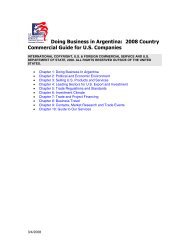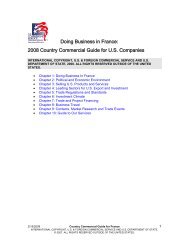Doing Business In Saudi Arabia - Bna
Doing Business In Saudi Arabia - Bna
Doing Business In Saudi Arabia - Bna
Create successful ePaper yourself
Turn your PDF publications into a flip-book with our unique Google optimized e-Paper software.
5/13/2008<br />
Commercial Disputes Settlements: The enforcement of foreign arbitration<br />
awards has yet to be upheld in practice. Government agencies are not allowed<br />
to agree to international arbitration without approval from the Council of<br />
Ministers, which is rarely granted.<br />
<strong>Business</strong> Visas: All visitors to <strong>Saudi</strong> <strong>Arabia</strong> must have a <strong>Saudi</strong> sponsor in order<br />
to obtain a business visa to enter <strong>Saudi</strong> <strong>Arabia</strong>. Notwithstanding, The Council<br />
of Ministers issued a resolution on 24/10/1428H (November 5, 2007) approving<br />
charging a SR 1,000 ($266.67) fee for multi-entry visit visa for business people<br />
and those of similar standing, valid for one year, taking into consideration the<br />
principle of reciprocity for countries that levy lower fees or exempt <strong>Saudi</strong><br />
business people from visa fees. The new resolution is till to be enacted.<br />
Delayed Payments: Although the <strong>Saudi</strong> Government is keen to resolve any<br />
payment disputes and has reduced its arrearages in the last few years, the<br />
problem persists, and U.S. companies should check with the U.S. Embassy or<br />
Consulates for information on the current arrearage situation.<br />
<strong>In</strong>tellectual Property Protection: Though intellectual property protection has<br />
steadily increased in the Kingdom, piracy remains a problem. The application<br />
of a new Patent Law is proving to be cumbersome and problematic to foreign<br />
patent holders. Enforcement and transparency still lack. The Council of<br />
Ministers issued a resolution on 23/11/1428H (December 3, 2007) approving<br />
the Law of Trademarks for GCC countries.<br />
Counterfeiting: Although anti-counterfeiting laws exist, manufacturers of<br />
consumer products and automobile spare parts are particularly concerned<br />
about the widespread availability of counterfeit products in <strong>Saudi</strong> <strong>Arabia</strong>. There<br />
is still no clear and transparent mechanism to reduce and stop counterfeit<br />
products from entering <strong>Saudi</strong> <strong>Arabia</strong>.<br />
Arab League Boycott: The Gulf Cooperation Council (<strong>Saudi</strong> <strong>Arabia</strong>, Kuwait,<br />
Bahrain, Oman, Qatar, and the United Arab Emirates) announced in the fall of<br />
1994 that its members would no longer enforce the secondary and tertiary<br />
aspects of the Arab League Boycott. The primary boycott against Israeli<br />
companies and products still applies.<br />
Government Procurement: <strong>Saudi</strong> <strong>Arabia</strong>’s government contracts on project<br />
implementation and procurement strongly favor <strong>Saudi</strong> and GCC nationals.<br />
However, most <strong>Saudi</strong> defense contracts are negotiated outside these<br />
regulations on a case-by-case basis. <strong>Saudi</strong> <strong>Arabia</strong> published its revised<br />
government procurement procedures in August 2006. Foreign suppliers that<br />
participate in government procurement are required to establish a training<br />
program for <strong>Saudi</strong> nationals.<br />
Banking: Although the <strong>Saudi</strong> central bank, SAMA, has granted licenses to a<br />
number of foreign financial institutions to open branches in <strong>Saudi</strong> <strong>Arabia</strong>, these<br />
banks will only be allowed to provide investment banking and brokerage<br />
services, if applicable. No new licenses were issued in 2006 and there are<br />
currently 16 banks in <strong>Saudi</strong> <strong>Arabia</strong>, including five branches of foreign banks.<br />
Shipping: <strong>Saudi</strong> <strong>Arabia</strong> gives preferences to national carriers for up to 40<br />
percent of government-related cargoes with two companies taking advantage<br />
of this situation.<br />
Standards and labeling: As part of the GCC Customs Union, the six Member<br />
States are working toward unifying their standards and conformity assessment<br />
systems. However, each Member State continues to apply its own standard or<br />
a GCC standard. A new ICCP mandates that a Certificate of Conformity must












